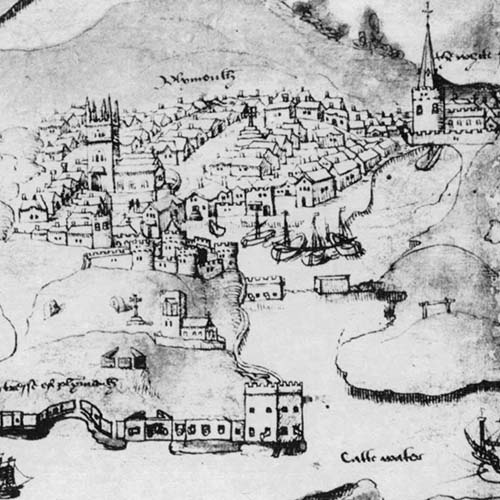Sic Parvis Magna Sample Chapter—First Impressions of Plymouth
After a day in the back of the wagon, Francis woke to a noxious smell. He wrinkled his nose, then sat up and looked around.
The road passed through a midden towards a massive, dark slate gatehouse with a maw that swallowed the line of country folk taking their goods to the Plymouth market.
At the tail of the line, Grandfather climbed down and took the horse by the reins.
A farmer at the end turned, studying the newcomers with suspicion. Francis shrank back from the stranger’s stare.
Mary stirred, opening her tired, bloodshot eyes. “Are you alright, Francis?”
Francis nodded.
“Mother, why do they hate us so?”
“Because we do not bow to their false gods. They make idols of wood and stone, praying to dead men and call them holy. They make their bread into a god and steal His glory.”
“But we worship the same God—”
“No!” Mary caught herself, lowering her voice. She leaned forward to him. “Did they see us as brethren when they set fire to our home? Stole our animals, took the land that your Grandfather’s grandfather worked? The Romish church serves the Antichrist himself.”
“Then what of the Psalm father teaches?” Francis pressed. “He that dwelleth in the secret place…”
“…shall abide under the shadow of the Almighty.” Mary completed the psalm.
“Where was His shadow last night?”
“The Psalm speaks not of earthly safety, and He does not promise that we will be spared hardship.” She touched his cheek. “We fled, yes. But we are not abandoned. Suffering has its purpose.”
“What purpose did our suffering serve?” His voice was barely above a whisper.
Mary’s fingers lingered against his cheek as she searched for words. “Sola fide. His plan is greater than what we see, Francis.”
Francis’s eyes fixed on a faraway point in a vacant stare.
Once it was their turn, Grandfather led the horse past the studded wooden gates into the arch of the gatehouse. The echoing clop of the horseshoes against the stone returned Francis to the present.
Two halberdiers clad in jack-of-plate armor stepped forward, tilting their pikes to stop the wagon. Francis’s eyes followed Grandfather as he approached an imposing sentry.
Standing in a wide stance, the man’s left hand rested on the hilt of his bullock dagger. A jagged finger-width scar ran from his temple to his upper lip. He greeted Grandfather with a disdainful, appraising look.
Lowering his head in a deferential nod, Grandfather reached inside his jerkin to produce a folded paper, which he offered to the guard.
The sentry unfolded and read the paper, examining the seal under the light of the nearby candle lantern. Following that, he scanned everyone in the wagon, his withering stare pausing on each person.
“Step aside!” he finally barked, waving off the halberdiers with a commanding gesture.
Francis breathed a sigh of relief as Grandfather got the horse underway again.
As they exited the gatehouse onto the streets of Plymouth, he took in the tapestry of the unfamiliar city opening before him.
Never having ventured outside of Tavistock, he shrank back, overwhelmed by the noise and chaotic intensity of this very foreign place.
Two- or three-story jettied houses crowded the street, some with a storefront under painted signs advertising the shop. Others were simpler, with a board laid out to display the goods which the merchants hawked.
He bit his lip.
There were people everywhere, and all of them seemed to be destitute, ragged, and dirty.
At least in Tavistock, there seemed to be more charity, he thought. Even though the abbey was dissolved, what remained of it left an imprint on the small community. It seemed less… menacing.
They passed a merchant tending to the wares spread on a board. She was an elderly woman in a dirty, oversized gray apron. Narrowing her eyes, she turned her head, tracking the passing wagon like a predator. Francis squirmed under her gaze. As he averted his eyes, he noticed others were also watching them.
He recoiled, pressing hard against Mary.
Next, his attention darted to what seemed to be an alley between two houses, where a fight broke out between two men. Others joined, and his eyes stayed glued to the scene, though he saw nothing of what was happening.
The wagon trundled through a few more turns and slowed in what seemed to be a different part of town. The din and stink of the marketplace vanished. The houses had large, prominent chimneys and glazed windows.
Gleaming coaches drawn by powerful black horses filled the street.
Francis’s eye caught how a footman rushed out of the house to open the coach’s door for a finely dressed man in an over-gown. After the passenger alighted, the footman handed the secretary box to a different servant. Without as much as a glance behind him, the man walked into the house.
So consumed was Francis by his observations, that he had not noticed that their wagon stopped.
“Marjorie, my sister!” an unfamiliar voice boomed, startling Francis. “How very nice to see you again! And John, and Edmund, and Mary! Welcome!”
Francis turned his head.
A tall, distinguished man stood in front of a stately house. He was dressed better than anyone that Francis had ever seen, wearing a fancy embroidered doublet over a white shirt, white knee-long breeches and hose. Pearlescent square buckles adorned his feet.
Next to him, dwarfed, stood Uncle John and a youth who looked like a younger, thinner, and more reserved copy of the man whose voice filled the street.
A solemn army of servants stood behind them.
Marjorie jumped off the wagon and ran up to the man with open arms.
“William, I see that time has been kind to you! And John Hawkins, I have not seen you in years! What a handsome young man you’ve grown into!”
Francis climbed down from the wagon and stood, shifting from one leg to another and holding an awkward smile.
“Francis,” Mary leaned close, “that’s William Hawkins, your great-uncle. He’s a man of great importance here in Plymouth. And that is his son, John.”
Francis examined John. He seemed older and more worldly. Dressed elegantly and standing in a wide stance with crossed arms, he appeared confident.
John looked over towards Francis. Sensing Francis’s awkward discomfort, he walked up to Francis, smiled, and extended his arm. “Hello, I am John Hawkins.”
“I am very pleased to meet you, John,” responded Francis, shaking his hand.
“I’ll show you where you will stay,” said John.
They walked into the house as the servants began to offload the wagon and carry their belongings inside, streaming past Francis like a river around a rock.
As they walked through the great house, Francis felt as if he were in some exotic and faraway land. Unlike their earthen-floor farmhouse with whitewashed walls, Francis trod on a polished oak floor. Dark panels lined the walls.
Biblical paintings competed for every inch of wall space with ship models and framed maps of places Francis had never seen before. Eyes from the portraits of stern-faced people followed Francis, making his skin prickle.
Suddenly, Francis stopped dead in his tracks.
He leaned in, examining every masterful brushstroke of a large oil painting of two ships in a pitched battle.
Smoke billowed from the cannons which protruded through the hulls like arrows out of a quill. One ship flew Saint George’s cross, while the other the Portuguese standard of Saint Vincent.
Noticing that Francis was no longer behind him, John returned.
“Father commissioned that painting after one of his battles. On the left is his William and John. The other ship, the Falcão, was so badly damaged that she caught on fire and sank during this battle,” he explained with a proud smile.
Lost in the scene, Francis took in the details—how the ships were positioned, the belch of fire and smoke, the chaos on decks. Somehow, for a brief while, the painting held him whole, his imagination carrying him far beyond the reach of his sadness.
Read the next scene, from the historical fiction novel Sic Parvis Magna, “History of Hawkins”
Did you miss the start? Read the opening scene, Going on Delivery or the overview of the sample chapter.
Read my comments about who is real in Sic Parvis Magna.










